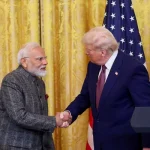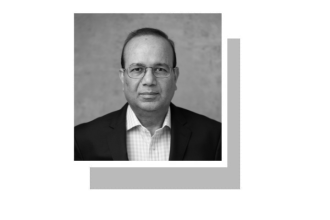PEACENIKS on both sides of the Radcliffe Line are eating humble pie; the warmongers radiate with their ‘told-you-so’ glow. Journalistic neutrality has been thrown to the winds; anchors, reporters and analysts have traded their reputations and professionalism for certificates of patriotism from state institutions. The hate wave is far more severe than the heatwaves that keep sweeping the region.
It is hard to say whether the dogfights in the sky were more dramatic and intense than the clashes on the airwaves. Seasoned veterans in international media were humbled by promising podcasters. The arguments of my favourite Mahabharata character’s namesake were thoroughly punctured on his talk show. Mr Thapar started the verbal battle with the full bravado of the Pandavas’ half-brother, but to his ‘guest’ Bilawal Bhutto-Zardari’s supporters, by the end of the programme, he lay like Bhishma on a bed of arrows. The chairman of the Pakistan Peoples Party, his fans believe, left victorious to the Balochi beat of Dilan teer bijan (an arrow to your heart), an anthem of sorts for the PPP whose electoral symbol happens to be an arrow.
None of this should be read as ‘we won’ because we are all losing our humanity. The Indian intransigence in refusing to provide evidence for Pakistan’s alleged involvement in the Pahalgam incident doesn’t help anyone.
The old trick of closing embarrassing and irritating cases with fake encounters where terrorists carry their IDs in their front pockets is as believable as Bollywood scripts these days. One hopes the real terrorists of Pahalgam are found, tried and brought to justice. Some of us still want the madness to stop despite the hate industry working double shifts.
We are all losing our humanity.
The deterrence theory of Mutually Assured Destruction may have overlooked the fact that madness has degrees; the mad could be destructive, but it is the raving mad who self-destruct. Seventy-eight years after the division of the subcontinent, to ostracise the ‘other’ remains an obsession on both sides. We do not seem to have enough discriminatory clauses in nikahnama; they are cancelling the Overseas Citizen of India status of persons with a Pakistani parent.
The respective systems have become so convoluted that, to make it work in your favour, you must follow the official narrative of hatred and otherisation. A musician and composer renouncing his nationality led to him gaining Indian citizenship because it portrayed Pakistan negatively. This is despite both his parents being Muslim; his father was Pakistani, and his mother was Indian from Jammu. Conversely, Aatish Taseer’s OCI was revoked because his father was prominent Pakistani politician Salmaan Taseer.
It is tragic that the man, whose Pakistani identity casts doubt on Aatish’s Indianness, could not escape the same bigotry in his own country. He was the governor of Punjab when he was shot dead by his guard for supporting a Christian woman’s right to defend herself against what later turned out to be false charges of blasphemy.
Aatish is the only son of Tavleen Singh, a well-known Indian journalist. In a recent interview, he described the absurdity of the fact that while Mr Modi called his mother to inquire about her ailing partner, he had no hesitation in stopping her only son from visiting his elderly mother or attending his maternal grandmother’s funeral.
This, unfortunately, is not the only tragedy to have befallen a Taseer. Aatish’s half-brother, Shahbaz Taseer, was kidnapped in broad daylight from Lahore and kept in the brutal captivity of an extremist network operating on both sides of the Durand Line for more than four years.
In this right royal mess, who are the people fawning over on both sides of the border? Kashish Mittal’s heartfelt rendition of Unke andaaz-i-karam, a ghazal originally made famous by Nusrat Fateh Ali Khan, nearly broke the internet when he looked into the camera in some friend’s living room and serenaded “Woh bhi apnay na huey, dil bhi gaya hathon say” (didn’t gain love and lost my heart too). While Khan sahib was a genius who could not be celebrated enough, the poem being referred to is by Naseeruddin Naseer, the late Pir of Golra Sharif, a shrine right in the middle of Islamabad.
We celebrated our Independence Day on the 14th of this month, followed by the Indians on the 15th. All the sabre-rattling and chest-thumping claims of victory could not stop a poet’s words written in the heart of Islamabad, covered by a former IAS officer in Delhi, from melting millions of hearts across the globe.
“Ishq par zor nahin hey yeh who aatish Ghalib: Keh lagaey na lagey, aur bujhae na baney” (love is fire that cannot be forced, Ghalib: It cannot be kindled or extinguished at will)
The writer is a poet. His latest publication is a collection of satire essays titled Rindana.
Published in Dawn, August 22nd, 2025










